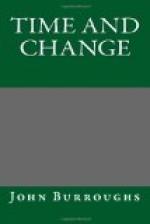As for the rights of property among the animals, I do not see how we can know just how far those rights are respected among individuals of the same species. We know that bees will rob bees, and that ants will rob ants; but whether or not one chipmunk or one flying squirrel or one wood mouse will plunder the stores of another I do not know. Probably not, as the owner of such stores is usually on hand to protect them. Moreover, these provident little creatures all lay up stores in the autumn, before the season of scarcity sets in, and so have no need to plunder one another. In case the stores of one squirrel were destroyed by some means, and it were able to dispossess another of its hoard, would it not in that case be a survival of the fittest, and so conducive to the well-being of the race of squirrels?
I have never known any of our wild birds to steal the nesting-material of another bird of the same kind, but I have known birds to try to carry off the material belonging to other species.
But usually the rule of might is the rule of right among the animals. As to most of the other commandments,—of coveting, of bearing false witness, of honoring the father and the mother, and so forth,—how can these apply to the animals or have any biological value to them? Parental obedience among them is not a very definite thing. There is neither obedience nor disobedience, because there are no commands. The alarm-cries of the parents are quickly understood by the young, and their actions imitated in the presence of danger, all of which of course has a biological value.
The instances which Mr. Seton cites of animals fleeing to man for protection from their enemies prove to my mind only how the greater fear drives out the lesser. The hotly pursued animal sees a possible cover in a group of men and horses or in an unoccupied house, and rushes there to hide. What else could the act mean? So a hunted deer or sheep will leap from a precipice which, under ordinary circumstances, it would avoid. So would a man. Fear makes bold in such cases.
I certainly have found “good in everything,”—in all natural processes and products,—not the “good” of the Sunday-school books, but the good of natural law and order, the good of that system of things out of which we came and which is the source of our health and strength. It is good that fire should burn, even if it consumes your house; it is good that force should crush, even if it crushes you; it is good that rain should fall, even if it destroys your crops or floods your land. Plagues and pestilences attest the constancy of natural law. They set us to cleaning our streets and houses and to readjusting our relations to outward nature. Only in a live universe could disease and death prevail. Death is a phase of life, a redistributing of the type. Decay is another kind of growth.




